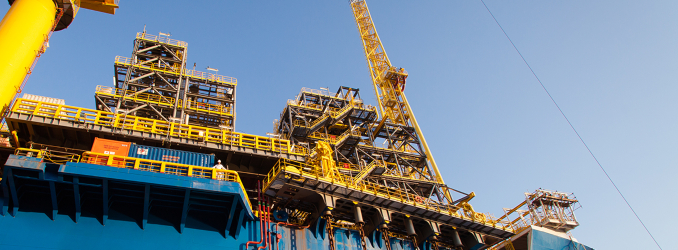(Bloomberg) – Petrobras sought to divest control of some offshore oil fields in a move that would have shielded the Brazilian oil giant from hefty costs to dismantle old platforms.

The moves involved reaching out to smaller companies in recent months about taking controlling stakes in a group of shallow-water fields, many of which were shut when global energy markets collapsed in the early days of the Covid 19 pandemic, according to people familiar with the moves who asked not to be named discussing non-public information.
The divestment effort, which hasn’t been previously reported, ran aground in August when the National Agency of Petroleum, Natural Gas and Biofuels rejected Petrobras’ request to perform tests needed to resume oil production at 13 shallow-water fields, the people said. The testing would have been a key step in eventually handing control of the fields to other operators.
Global spending on decommissioning in the offshore oil industry could exceed $15 billion a year by 2033, according to consultant Wood Mackenzie Ltd..
In response to questions, the agency known as the ANP said Petrobras must decommission the facilities at 13 fields, even though regulators may decide to offer those assets in a licensing round at a later date.
In the oil industry, decommissioning typically involves plugging wells with cement and dismantling or sinking platforms and other gear once a field has reached the end of its productive life. The work can cost tens of millions of dollars or more, depending on the age of the equipment, depth and distance from shore.
Petroleo Brasileiro SA, as the company is formally known, declined to comment on the divestment process for those fields.
However, a Petrobras spokesperson said that the wind-down costs for those fields were included in its most recent five-year business plan, and that the company fulfills its legal obligations to decommission assets under concession.
Oil producers around the world often keep aging fields operational to postpone decommissioning costs. It’s also common for major explorers to sell legacy fields to smaller operators, in part to pass on at least a portion of those expenses.
Global spending on decommissioning in the offshore oil industry could exceed $15 billion a year by 2033, according to consultant Wood Mackenzie Ltd.
“They will do everything they can to postpone those costs,” said Luiz Hayum, Wood Mackenzie’s principal upstream research analyst for Latin America. “It’s capital expenditure that doesn’t give a return on investments.”
Some of the fields Petrobras has been trying to sell are just a few miles off the coast of Sergipe state in northeastern Brazil, the people said. In that region, Petrobras estimates it will cost $1.7 billion to retire 26 platforms.
The abandonment-cost issue is rearing its head at time when Petrobras already is contending with a weaker oil-price outlook. Chief Executive Officer Magda Chambriard said in an interview with Bloomberg News in August that exploration spending will shrink in the next five-year spending plan.

